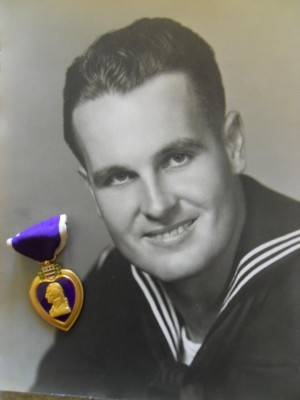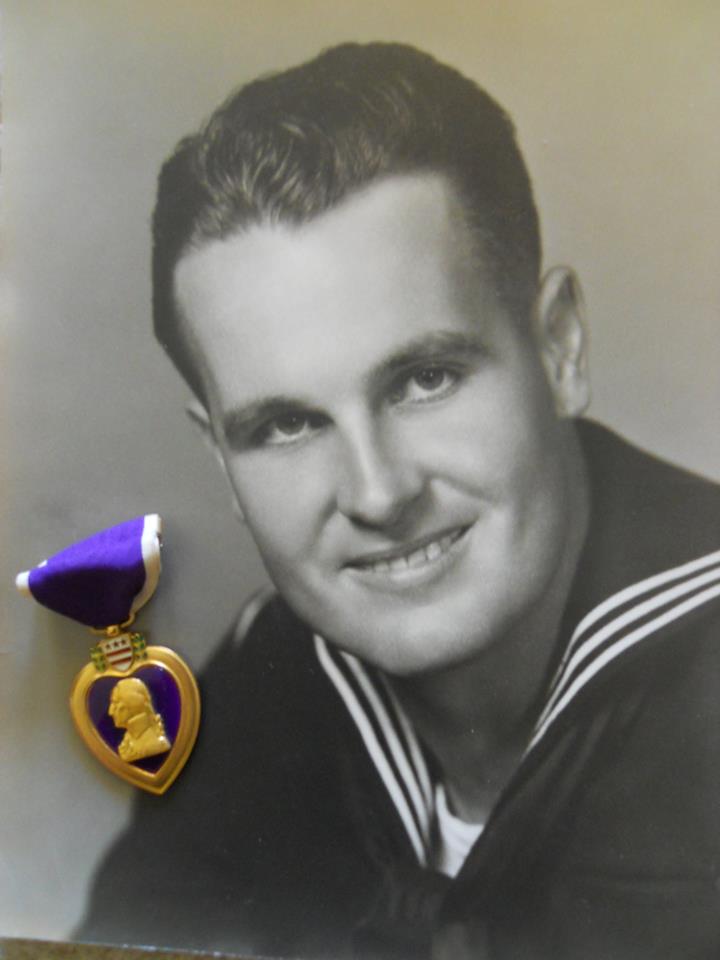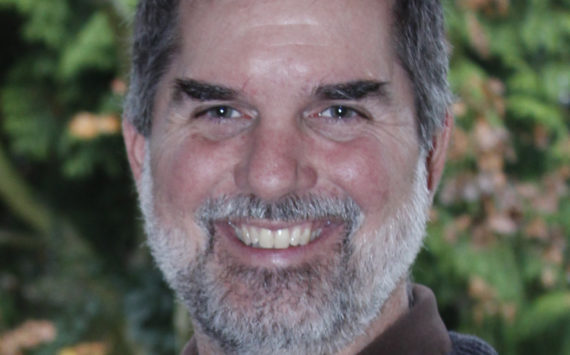Starting at 4:00 a.m., the mine sweeper YMS-481, along with others of its class, began its second day of clearing the waters near Tarakan City, on the east side of Borneo. Heavily fortified by the Japanese, the oil produced there was of such a high grade that it didn’t need to be refined before being used, and therefore a high-value target for the combined American and Australian forces that were amassing offshore.

“We swept mines all day long,” said Raymond Gerald Baker, my grandfather who was an engineer on the YMS-481. “We swept contact mines, acoustical mines. We swept so close that we could see the (Japanese) soldiers on land. They had fox holes right on the beach. They would come up out of their fox holes and they’d look at us, and we’d look at them.
“About 2:30 in the afternoon they disappeared. We didn’t see them any more. We thought something was happening.”
While engaged in mine sweeping, crewmen could not stay down in the engine rooms. Grandpa’s domain was the auxiliary engine room, with an entrance so small that he had to remove his bulky “Mae West” life jacket to crawl through the manhole cover to the room below.
“Every 20 minutes we’d have to make a quick trip down, check everything and come back out,” he said. “I had just come out. That’s when they opened up on us.”
Though the crew of the YMS-481 and the fleet of minesweepers had sensed what was coming, it still came almost out of nowhere.
“The first big shell was fired from a 3-inch cannon gun in a cave, hit our ship,” he said. “It was a severe hit. It was almost point blank range. It blew four of our men off that were assigned to our 3-inch gun. Two survived and two were killed. From that time … all hell broke loose.”
Two 20mm cannons and two 50 caliber machine guns fired back, but thick jungle and weaponry hidden in caves made it a tough go.
“They opened up on us first,” said my grandfather. “We were the second from the last (in a line of mine sweepers). They hit the mine sweeper behind us. It was damaged, but not destroyed.”
Soon, the order came to abandon ship.
“A shell hit up front near the magazine area. The back end was blown off, practically,” he said.
Wounded, his memories grew fuzzy. Some of them.
“I remember being hit in the back, but I don’t remember much. I was bleeding bad. I remember sticking my thumb through my Mae West to stop the bleeding. It was shooting out. I could see it from my back. But the little guy next to me, who was only 18 years old, had his arm basically shot off. His arm was dangling. Something was holding it. I wrapped a tourniquet around it. I don’t remember what I used. I made a tight tourniquet and told him to hold onto it.”
Into the water, but certainly not safe, my grandfather and his mates went.
“From that time I have very little memory. I don’t remember what hit my head at all. That knocked me out.”
About six hours later, a landing craft on the verge of giving up its search for survivors fished the semiconscious sailor out of the water.
“They jumped overboard, they wrapped some kind of wrap around my back and over my arm and pulled me aboard,” he said. “I remember (hearing) ‘Let’s get the hell out of here.'”
He was far from the only survivor on that last rescue boat, but by the time it returned to one of the destroyers in the fleet, he’d been given up for dead. As wounded soldiers were taken on board the ship, my grandfather was left for dead.
“Then someone saw me breathe or something,” he said. “They took me off last.”
My grandfather passed away… last week, at the age of 95, nearly 70 years after the YMS-481 went down on May 1 or 2, 1945, depending on which records one believes.
Some of my earliest recollections of my grandfather are of sitting in his lap and discovering, to my wonderment, that he had pieces of metal buried in his body.
You couldn’t see them, but you could feel them. I was probably only three years old, but that was when I learned the word “shrapnel.”
It seemed like a pretty cool word. I later learned that he had been on a mine sweeper in the South Pacific that had been sunk, and that the shrapnel, along with his elegantly scarred right ear, were a result of that battle in World War II.
And while he was proud of his status as a U.S. Navy veteran, not only did he rarely speak of his war experiences, most of the details of that period of his life were new to me as recently as four years ago, when he finally consented to sit down with my parents and recount his bit of war history.
So, details were few until his remarkably candid and detailed recollection of that relatively brief but significant period of his life.
Interestingly, he probably could have avoided military service, even at the height of war, had he chosen to. Not only was he married with two young sons, John and my father, Bob, but he was working in the oil fields in southern California, considered a vital industry in support of the war effort.
One of his brothers was in the Army Air Corps and the other involved in counterintelligence, and he felt both the desire to contribute and the pressure to serve.
“At my age I was asked a lot of questions about why I wasn’t in and it began to work on me,” he said. He quit his job, taking on some temporary work, and six months later was drafted, taking advantage of being offered a choice to enter the Navy.
He trained at bases in Farragut, Idaho; Waukegon, Illinois; and Richmond, Virginia, primarily in diesel engineering.
After spending about two weeks at home over Christmas of 1944, he shipped out from San Francisco on a converted cruise liner, but ran into some unforeseen issues upon landing in Honolulu, where the ship stopped to let off Navy WAVES.
“I was waving at people, and everybody was hollering and waving at us from the dock,” Grandpa said. “I had someone come up behind me – I had my shirt off, even my t-shirt, to cool down.
“Guy taps me on the back and says he wants me to come into the dispensary. I asked what was going on and he said, ‘You’ve got a rash all over your back.’ It was a heat rash, but boy they didn’t take any chances. They took my temperature and my temperature was about 100. They had me isolated on a gurney, got me down on that. I was off that ship in less than 20 minutes. They thought I possibly had scarlet fever or measles, because my back had that rash on it.”
He said a friend of his saw the commotion from afar as he was hurriedly removed from the ship, without having any idea what was going on.
“The ship couldn’t leave until the Navy sent a military ambulance from the Naval hospital, 20-30 minutes to get there. They had me off and in that thing. Lyle was up there looking down, and he couldn’t figure out what happened. I couldn’t figure out what happened either. No one knew what was happening, but I held that ship up 35-40 minutes…
“They took me and put me in the isolation ward. I was right next door to all types of diseases in there. I was isolated in there for 14 days.”
After a month’s delay, he finally shipped out to the Admiralty Islands – somehow, remarkably, without orders – to the Leyte Gulf in the Philippines, where he found he’d been assigned to the mine sweeper.
“I don’t even know when I was assigned to it,” he said.
Like most wartime duties, mine sweeping was no picnic. Crews of ships like my grandfather’s scoured the bays, inlets and occasionally rivers for a variety of nasty surprises, primarily contact, magnetic and acoustical mines.
As Grandpa described them, the contact mines were covered with spikes or prongs that acted as a trigger when a ship came in contact with them.
Magnetic and acoustical mines didn’t require physical contact to set off. Magnetic mines would be activated by the attraction to a metal ship passing overhead. Most Navy ships, by 1945, had anti-magnetic equipment to neutralize the attraction.
There was no counteracting the trigger for an acoustical mine, which was set off by the vibrations of passing ships.
“On our ship … we had a huge ball that looked like a bell on the front of the ship that could be lowered into the water,” Grandpa said. “It was about two and a half feet in diameter. Looked like a bell. On the one end it was about two or two and a half inches of heavy steel that was bolted outside that bell. There was a magnetic jackhammer that was controlled by, I think air pressure. It would hammer against the two inch plate of steel on the outside.
“Not only that, we had rattlers. They were long tubes of pipe we could drop down into the water. They had circular rings on them that circulated and rattled against the pipe.
“First we would sweep for contact mines. We couldn’t do contact mines and others at the same time. Then we’d sweep for magnetic mines and acoustical mines.”
Of course, his life didn’t end after the YMS-481 was lost. He’d lost so much blood that an admiral awarded him his Purple Heart within a day or two while still on board ship with the words, “I think you’re going to survive.”
His injuries were extensive, including his ruined right ear, brain damage and a partially severed spinal cord and countless shrapnel wounds.
“Only 15 or 16 amounted to anything,” he said. “The others were just tiny fragments.”
Even so, he could never go near an MRI unit for fear that the fragments would be torn from his body.
His spinal injury was unique enough that a Jewish physician who had escaped Nazi Germany and lived in San Diego was one of two doctors in the world that had the expertise to treat him.
“The spinal injury that still affects me,” Grandpa said. “I still don’t have good vision for quick movements. There was a lot of brain damage; he was aware of that. But up in the neck area. I had shrapnel up there, that is still there. They wouldn’t take it out.”
There was plenty of support at the time for returning veterans as well, at least in his experience.
“After one of my surgeries, I don’t remember which one, I was outside my room,’ Grandpa recalled of one memorable post-war event. “Helen Keller, born without any hearing or vision, was down there at the base. She and her assistant (it was not Annie Sullivan, she had passed away by that time), they came walking along. She walked up to me. I could talk to her assistant and her assistant would talk to me. Then Helen Keller grabbed my neck, and held onto my neck. Felt the vibrations of my talking. I could talk to her, and she could talk clear enough to where I could understand her. I had quite a visit with her.”
Dozens of surgeries later – including two attempts to provide him with an artificial ear drum – he was back at work at the Signal Hill oil fields as he had been before the war.
To his grandkids, other than the shrapnel and his very cool “war ear,” you’d never have known he was anything other than the picture of health.
Of course, there was far more to his life than that; married to my grandmother Eleanor for 55 years, living in the same house a stone’s throw from what is now Disneyland from 1939 until just last year, and all that 95 years of life implies.
Another of the Greatest Generation is gone, this man the last of that generation in my family.
The “Baker” in me wants to think of him as unique, but in many ways he was not, and that’s a good thing. Like the other World War II veterans I’ve had the honor of profiling here – Jim Pruitt, Floyd Kennedy and Hugh Maycumber – their stories need to be told, so their legacies won’t be forgotten, and the horrors that demanded their sacrifice may one day cease to be repeated.




Comments are closed.